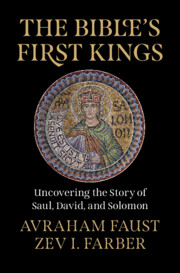Book contents
- The Bible’s First Kings
- The Bible’s First Kings
- Copyright page
- Contents
- Figures
- Preface
- Acknowledgments
- Part I The United Monarchy in the Bible and Contemporary Scholarship
- Chapter 1 Israel’s United Monarchy
- Chapter 2 Untangling the Threads of the Biblical Account with Literary Critical Scholarship
- Chapter 3 Deconstructing (and Reconstructing) the United Monarchy as Historical
- Part II The Archaeology of the Tenth Century BCE
- Part III A New Paradigm
- Afterword
- Bibliography
- Index
Chapter 3 - Deconstructing (and Reconstructing) the United Monarchy as Historical
Passing the Baton to Archaeology
from Part I - The United Monarchy in the Bible and Contemporary Scholarship
Published online by Cambridge University Press: 16 January 2025
- The Bible’s First Kings
- The Bible’s First Kings
- Copyright page
- Contents
- Figures
- Preface
- Acknowledgments
- Part I The United Monarchy in the Bible and Contemporary Scholarship
- Chapter 1 Israel’s United Monarchy
- Chapter 2 Untangling the Threads of the Biblical Account with Literary Critical Scholarship
- Chapter 3 Deconstructing (and Reconstructing) the United Monarchy as Historical
- Part II The Archaeology of the Tenth Century BCE
- Part III A New Paradigm
- Afterword
- Bibliography
- Index
Summary
The consensus around the historicity of the United Monarchy is long gone, as already noted in the previous chapter’s conclusion. This chapter first expands on the old consensus, describing its decline and even “death” as it unfolded in the 1990s. It then describes the concomitant rise and development of the minimalist school, which, while failing to make many converts, had a major impact on scholarship. The chapter then looks at changes in the way the archaeology of the period is perceived by many biblical scholars, many of whom have become skeptical or even dismissive of the possibility of a large Israelite polity in the tenth century, and the word “empire” has all but disappeared from the discourse. The chapter pushes back against this excess of caution, examining how the supposed archaeological and historical reasons for it have not stood the test of time. Indeed, discoveries made over the past twenty years or so challenge this new skepticism and instead reinforce a more sophisticated version of the older views, which worked with the idea of a United Monarchy in this period.
Keywords
Information
- Type
- Chapter
- Information
- The Bible's First KingsUncovering the Story of Saul, David, and Solomon, pp. 59 - 106Publisher: Cambridge University PressPrint publication year: 2025
